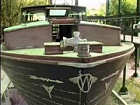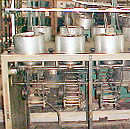 L-3 entered into a Consent Order last week for export violations of its subsidiary Titan. L-3 acquired Titan in June 2005 several years after the violations had occurred. The violations at issue were the failure by Titan to report commissions paid by Titan in connection with three sales of ITAR-listed items to Sri Lanka, France and Japan in 2000, 2002 and 2003 respectively.
L-3 entered into a Consent Order last week for export violations of its subsidiary Titan. L-3 acquired Titan in June 2005 several years after the violations had occurred. The violations at issue were the failure by Titan to report commissions paid by Titan in connection with three sales of ITAR-listed items to Sri Lanka, France and Japan in 2000, 2002 and 2003 respectively.
The Draft Charging Letter starts with a recitation of Titan’s violation of the Foreign Corrupt Practices Act. As is well known by now, Titan was convicted in March 2005 for the payment of more than $2 million to the re-election campaign of the President of Benin in order to induce Benin to award Titan a contract to build and to operate a wireless telephone network. Hmmm. A wireless telephone network? Is that a defense article? Umm, no. So why is DDTC putting that in the Draft Charging Letter? The answer appears to be for no apparent reason other than to suggest that if Titan is capable of violating the FCPA, it is capable of violating the Arms Export Control Act as well. It’s a good thing that DDTC doesn’t normally have to argue things in court because this kind of argument wouldn’t make it very far in front of a real judge.
The real violations charged by the Draft Charging Letter have nothing to do with the FCPA or the Benin bribes. Instead the violations arise solely from three commissions that weren’t reported by Titan as required by Part 130 of the ITAR. The unreported commissions related to three separate export license applications to Sri Lanka, France and Japan mentioned above.
As anyone has struggled with interpreting the requirement of ITAR’s Part 130 to report commissions knows, the issue is always whether a payment to an agent is is instead exempted from reporting under section 130.5(b)(4) because it is a “payment made . . . for . . . technical, operational or advisory services, which payments are not disproportionate in amount with the value of the goods or services actually furnished.” All commissions are arguably paid for technical, operational or advisory services, so the question is always whether or not they are disproportionate. Needless to say, “disproportionate” is an extremely vague standard. In one of the charged violations, the commission falls pretty far on the other side of disproportionate — $1.2 million on a $2.5 million dollar sale (48%). However, in the other two cases — $109,000 on a $870,000 sale (12.5%), and $958,000 on a $7.4 million sale (12.9%) — it is a bit harder to conclude that the payment is disproportionate.
In the Consent Order, L-3 agreed to pay a fine of $1.5 million. That fine consisted of a $1 million dollar cash payment and a $500,000 credit against the costs of the compliance program that L-3 agreed to conduct pursuant to the Consent Order. The good news for L-3, relatively speaking at least, is that DDTC agreed in the consent order to suspend the application of ITAR section 120.1(b) which made L-3 ineligible for export licenses due to its FCPA conviction. DDTC also declined to impose debarment as a penalty for Titan’s failure to report the commissions at issue.
 According to a report from television station WTVJ in Miami, Florida, a small group of craftsmen in Cuba are trying to restore “The Pilar,” the fishing boat which was owned by Hemingway and which was captained by Gregorio Fuentes, the presumed model for the protagonist in The Old Man and the Sea.
According to a report from television station WTVJ in Miami, Florida, a small group of craftsmen in Cuba are trying to restore “The Pilar,” the fishing boat which was owned by Hemingway and which was captained by Gregorio Fuentes, the presumed model for the protagonist in The Old Man and the Sea. 
 Posted by
Posted by  Category:
Category: 

 L-3 entered into a
L-3 entered into a  The U.S. Attorney’s Office for the District of Columbia
The U.S. Attorney’s Office for the District of Columbia  On Monday, October 16, Russia’s ambassador to the U.N. Vitaly Churkin
On Monday, October 16, Russia’s ambassador to the U.N. Vitaly Churkin  In a
In a 

